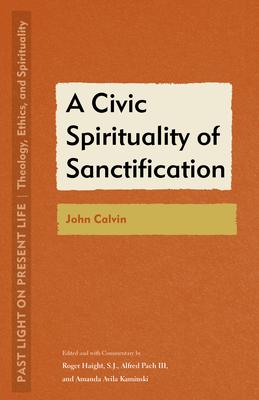This volume presents the spirituality of John Calvin in three short texts drawn from his Institutes of the Christian Religion. Many consider Calvin the most influential thinker of the sixteenth century. His ideas flowed from Geneva into northern Europe, to the English-speaking lands of Britain, and through the Puritans to North America. The prolific writings of Calvin across several genres open up many aspects of Christian living, and each one offers an entrée to his spirituality. On the sup-position that "spirituality" refers to the way people or groups lead their lives in relation to ultimacy, three texts have been chosen to form the axis for this interpretation of Calvin’s contribution. These texts deal with his theological view of law, a definition of sanctification, and a short treatise on the Christian life. The portrait of Calvin’s spirituality that emerges from these texts and the larger framework of his theology, his ecclesiology, and his career as church leader and civic organizer can be summarized in the following phrase: a practical spirituality of sanctification by participation in society. One cannot find all of that in these texts, but they establish a platform on which the pieces fall into place. The story of his early life and formation, along with several key ideas that characterize the man and his vision, will help to draw a sharper, more distinctive picture of at least this influential aspect of Calvin’s spirituality. It is one that bears direct relevance, with appropriate adjustments, to life today.
| FindBook |
有 1 項符合
A Civic Spirituality of Sanctification: John Calvin的圖書 |
 |
A Civic Spirituality of Sanctification: John Calvin 出版社:Fordham University Press 出版日期:2024-04-02 語言:英文 規格:平裝 / 160頁 / 普通級/ 初版 |
| 圖書館借閱 |
| 國家圖書館 | 全國圖書書目資訊網 | 國立公共資訊圖書館 | 電子書服務平台 | MetaCat 跨館整合查詢 |
| 臺北市立圖書館 | 新北市立圖書館 | 基隆市公共圖書館 | 桃園市立圖書館 | 新竹縣公共圖書館 |
| 苗栗縣立圖書館 | 臺中市立圖書館 | 彰化縣公共圖書館 | 南投縣文化局 | 雲林縣公共圖書館 |
| 嘉義縣圖書館 | 臺南市立圖書館 | 高雄市立圖書館 | 屏東縣公共圖書館 | 宜蘭縣公共圖書館 |
| 花蓮縣文化局 | 臺東縣文化處 |
|
|
圖書介紹 - 資料來源:博客來 評分:
圖書名稱:A Civic Spirituality of Sanctification: John Calvin
內容簡介
作者簡介
Roger Haight (Edited By)
Roger Haight, a Visiting Professor at Union Theological Seminary in New York, has written several books in the area of fundamental theology. A graduate of the University of Chicago, he is a past president of the Catholic Theological Society of America.
Alfred Pach III is an Associate Professor of Medical Sciences and Global Health at the Hackensack Meridian School of Medicine. He has a Ph.D. from the University of Wisconsin in Madison and an MDiv in Psychology and Religion from Union Theological Seminary. Amanda Avila Kaminski (Edited By)
Amanda Avila Kaminski is an Assistant Professor of Theology at Texas Lutheran University, where she also serves as Director of the program in Social Innovation and Social Entrepreneurship. She has written extensively in the area of Christian spirituality.
|











